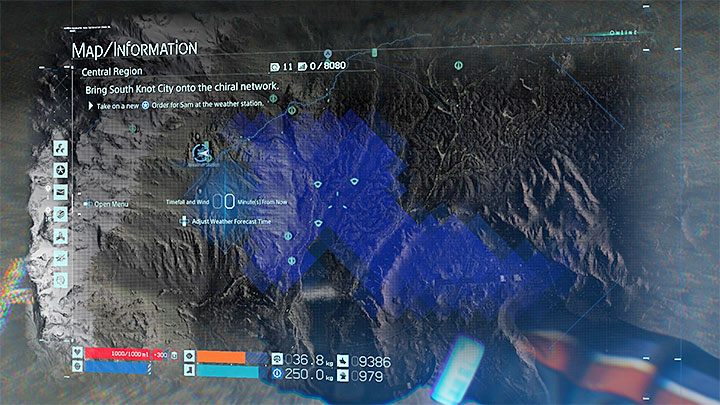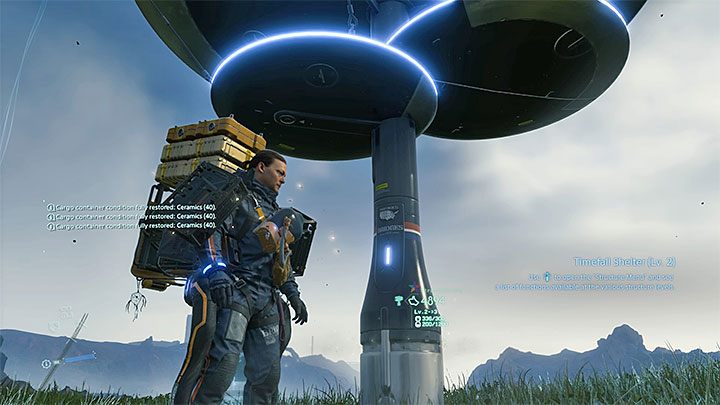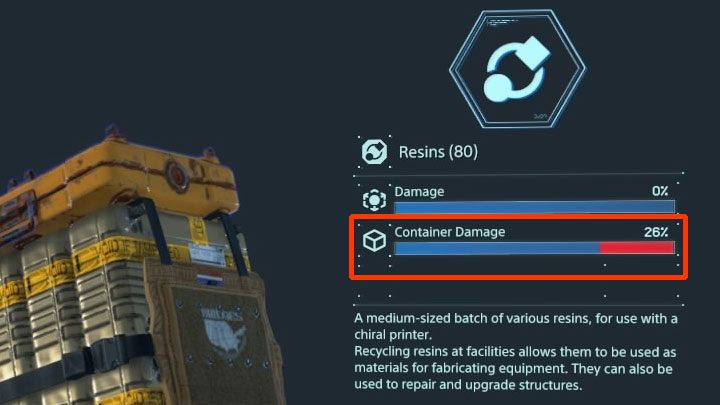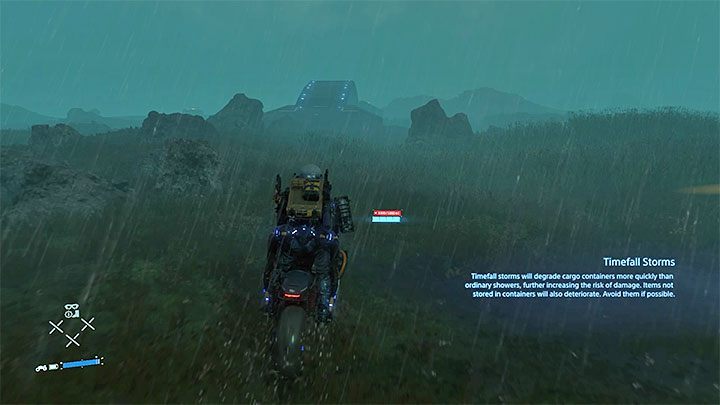Death Stranding: What is a Timefall?
On this page of our guide to Death Stranding we explain what is a Timefall (also known as temporary rainfall), how to react when it occurs and what it may cause.

Timefall is a unique weather phenomenon in Death Stranding. The easiest way to describe it would be to classify it as contaminated rain, which ages everything it comes into contact with.
- In the case of humans, the skin gets aged. The main character is not in any danger thanks to his special protective hazard suit, but during the game you will meet characters who got affected by this condition.
- In the case of cargo and structures, their surface is gradually damaged. The effects of rainfall are not extremely severe, but a single long-term Timefall can weaken the durability of a cargo or structure by several dozen percent.


In the initial phase of the game, the occurrence of Timefall is more difficult to predict. Timefall may appear primarily in imposed and scripted moments of some story missions and we warn you about such dangerous events in our walkthrough.
Other players may warn you about Timefall areas by signs and markings left somewhere in the game world. You can place such markers in the game world by yourself and help other players.

Things get better after you complete 27th quest related with the main story - Chiralium Gauge Delivery: Weather Station. You will unlock weather forecast feature as a reward for completing this task. You can browse them by pressing the right analog knob while on the world map. Areas with a risk of Timefall rain will be marked in blue. You can check the forecast in advance and additionally analyze the wind strength and direction to find out where the next Timefall may occur.

For completing mission 27 you will also receive another important reward - the Timefall Shelter. It is a large structure that can be built by using an assembler. In this construction, you can hide from the rain or temporarily leave the cargo in a safe spot for the time of other activities performed in a given area (remember not to move too far away from the dropped items).
If you are playing online you can find temporary shelters set up by other players and they have the same application. Alternatively, you can also look for other shelters that will protect you from the Timefall, such as the interiors of ruined buildings, tents or allied bases.

As we have already mentioned, Timefall can damage objects it comes into contact with:
- In the case of cargo, the container gets damaged first. You don't usually have to worry about the items you currently transport, as the damage to the container will still be minor at the end of the contract. The case is different if the container was additionally damaged as a result of a fall or if you carry an item for a long time. Then it is worthwhile to get interested in a container repair spray - we described it in more detail on a separate page of our guide - How to repair a damaged cargo?.
- In the case of all erected structures (bridges, generators, mailboxes, etc.) you can repair them. When you approach a built object, hold down the Options button and select a repair option from the list. You must use materials in order to repair an item/construction. In most situations, you don't have to worry too much about the deteriorating condition of the structure, because during the journey you will come across a lot of useful objects placed by other players.

Two other, although very similar, weather phenomena start to appear later in the campaign: temporal snow and temporal storms. Effects of these weather phenomena are almost identical - they cause the things, they come into contact with, to age gradually. However, in the case of storms / downpours, this process progresses much faster. It is worth reacting accordingly and:
- Stop on your way to your destination in allied locations to rest and replenish your supplies.
- It is mandatory to take a repair spray with you.
- Rely on temporal shelters more often, either built by yourself (always travel with an assembler) or built by other players.
- Death Stranding Guide
- Death Stranding: Game Guide
- Death Stranding: FAQ
- Death Stranding: Exploration and cargo transportation
- Death Stranding: How and why it's worth to expand the road network?
- Death Stranding: Are there any traditional firearms in the game?
- Death Stranding: What is premium delivery?
- Death Stranding: How to use a zip-line?
- Death Stranding: How to get the armor?
- Death Stranding: How to get crafting materials?
- Death Stranding: Where can I find Conan O'Brien?
- Death Stranding: Where should I go next?
- Death Stranding: What is the Porter Grade?
- Death Stranding: What happens after the hero dies?
- Death Stranding: How to increase the load capacity limit?
- Death Stranding: What role does BB (Bridge Baby) play?
- Death Stranding: Where to store unnecessary equipment?
- Death Stranding: What should I do if my shoes wear out?
- Death Stranding: How to repair a damaged cargo?
- Death Stranding: What is a Timefall?
- Death Stranding: Is it possible to change the appearance of the character?
- Death Stranding: How to get an exoskeleton?
- Death Stranding: How to collect Chiral Crystals?
- Death Stranding: How to get and start a new motorcycle?
- Death Stranding: Is there a fast travel option?
- Death Stranding: What are memory chips for?
- Death Stranding: Exploration and cargo transportation
- Death Stranding: FAQ
- Death Stranding: Game Guide
You are not permitted to copy any image, text or info from this page. This site is not associated with and/or endorsed by the developers and the publishers. All logos and images are copyrighted by their respective owners.
Copyright © 2000 - 2025 Webedia Polska SA for gamepressure.com, unofficial game guides, walkthroughs, secrets, game tips, maps & strategies for top games.
